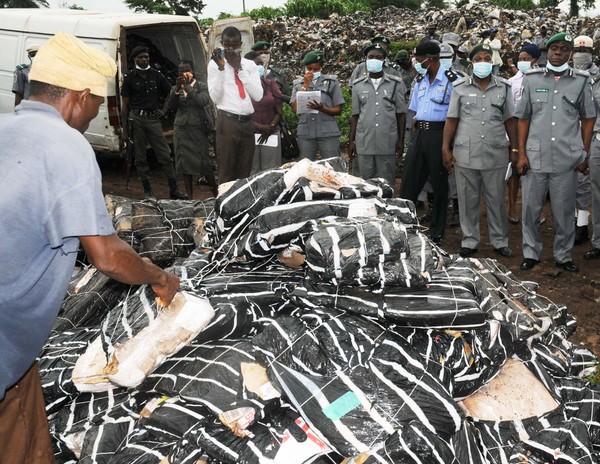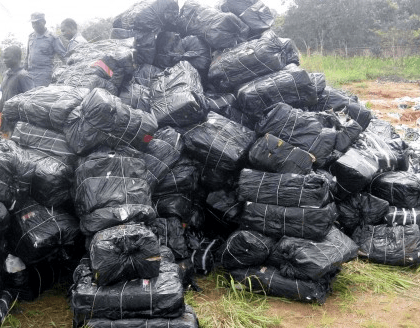Seven weeks into the launch of operation ‘Hawk Descend’- an initiative by the Nigeria Customs Service (NCS) to curb importation of smuggled poultry products into the country has indeed being a trying period for smugglers of the product.
Former Comptroller General of Customs, Dikko Abdullahi had during the launch in Seme on July 7th assured that within three months of the campaign which would target the South Western axis, importation of smuggled poultry would be curtailed.
“I can assure you that with this operation, smuggled poultry products will be stopped within the next few weeks but we are giving it three months so that we can sustain it on regular basis,” Abdulahi who was represented by Deputy Comptroller General, Enforcement, Investigation and Inspection, Musa Tahir said.
No doubt, the anti-smuggling operatives of the NCS had within the past one month made appreciable seizure of smuggled poultry as it recorded a total of 33,356 cartons worth N111 million.

CONFERENCE IN IBADAN ON WEDNESDAY (13/6/12).
A breakdown of the seizures showed that 1,803 cartons worth over N12million were seized in the first week of the operation; 6,206 cartons valued at N21.8 million recorded in the second week and 5,915 cartons worth N28.6 million in the third week.
The Service in the fourth week recorded seizures worth N35.6 million which consist of 5, 472 cartons while 13,960 cartons valued at N45.5million was seized in the fifth week.
The NCS renewed onslaught against smuggling of frozen poultry into the country has equally elicited commendations from the Poultry Association of Nigeria (PAN).
The Director-General of the association, Onallo Akpa in a statement issued recently said: “The leadership of the Poultry Association appreciates the excellent performance through various acts of onslaught, arrests and confiscation of smuggled poultry products into the country. This is very unprecedented, as we can boldly say that operation “Hawk Descend” is a highly successful exercise.”
The NCS also recently signed a bilateral agreement with the Customs administration of Benin Republic to synergize and share intelligence to boost operations along the borders. To actualise this agreement, the NCS had supported Benin Customs administration by donating five brand new pick-up double cabin vehicles.
However, despite increase in the number of seizures and effort by Customs to rid the country of illegal importation of poultry which has over the years threatened the investment of local farmers, activities of smugglers of the product through the land borders and waterways had continued unabated.
It is a known fact that Nigeria is an import dependent economy but in order to allow local manufacturers thrive, the Federal Government had placed some items including poultry products under import prohibition list to discourage their importation. But rather than protect the local industries, the ban on importation of poultry products had continued to take a negative toll on the economy as the country is said to be losing $2.7 billion revenue (about N399.4 billion) annually to smuggling of poultry.
According to the President of PAN, Ayoola Oduntan, local demand for frozen chicken is about two million metric tonnes annually but Nigerian farmers are able to produce 300,000 metric tonnes only, leaving a gap of more than 1.7 million metric tonnes. He said out of this figure, smuggled chicken accounts for 1.2 million metric tonnes annually.
Investigation by SHIPS & PORTS DAILY showed that the markets are still filled with the smuggled poultry which are still being served at local restaurants as they remain the preferred choice for most consumers despite the recent hike in the price of the product following the launch of operation ‘Hawk Descend’.
The smugglers had within this period devised other ways to practice their illicit enterprise to bring the products into the country by using small vehicles to transport them through illegal routes.
Confirming this development, a statement on the website of the NCS signed by its Deputy National Public Relations Officer, Joseph Attah on the third week of operation Hawk Descend said many of the seizures recorded during the period was mostly conveyed in commercial vehicles.
Chairman, Agriculture and Non-Oil Group, Lagos Chambers of Commerce and Industry (LCCI) Wale Oyekoya in a chat with SHIPS&PORTS DAILY though acknowledged that the intensified effort of Customs is being felt by the smugglers with the increased number of seizures recorded on a weekly basis.
He however noted that the porous nature of the border has made it difficult for Customs to win the war against importation of poultry products.
He said the smugglers now capitalize on the porous border and other illegal routes in connivance with some unscrupulous officers to bring in smuggled poultry adding that most of the imported frozen products currently sold in the markets are smuggled and have increased in prices because of the risks the smugglers had to go through in importing them into the country.
“The initiative by Customs is working as the effect is being felt by the smugglers. The only thing we advise is that Customs should intensify their effort because we have so many porous borders that these poultry and other contraband come in through. We are still convinced that some customs officers still collect money from the smugglers and that why it is still difficult to control.
“In fact, more smuggled poultry are even entering into the country now than before because we have too many borders and Customs cannot really man the borders and the ones entering into the country are more expensive because of the risks the smugglers have to go through in bringing them in,” he said.
Oyekoya however advice Customs not to limit its fights against smuggled poultry to border towns but should also beam its searchlight on cold room operators.
“I think Customs has to go beyond going to the border, they have to go to the markets and seize them from their warehouses. They know the cold room where these poultry are stored because they (smugglers) smuggled them in large quantity so it is still entering into the country through so many means,” he said.
Oyekoya also noted that special consideration must also be given to the method of disposing the seized products if Customs is really serious about sustaining the fight and not just adopting a fire brigade approach.
“Another problem is where to really destroy the seized goods because already it is causing environmental pollution because they are doing it locally. I see no reason why Customs cannot buy an incinerator. It does not cost much,” he said.
Oyekoya also called on the Federal Government to enhance the development of the poultry sub-sector to meet the nation’s consumption needs.
According to him, the government should do more to encourage the local farmers than just enforce ban on poultry products.


